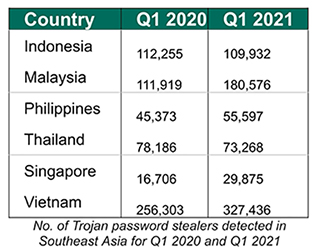
Every year, the first Thursday of May is World Password Day dedicated to promoting safer password practices.
This year, May 6 is World Password Day but every day is a good day to revisit the strength of your security codes as cybercriminals are continuously trying to gatecrash into your online accounts, says cybersecurity firm Kaspersky. The company has provided the most recent data available to prove that personal data continues to be a target for cybercriminals.
Kaspersky says it has prevented 25% more password stealers in Southeast Asia (SEA) during the first three months of the year compared to the same period of 2020.

The table reveals that Kaspersky solutions have blocked 776,684 Trojans designed to steal accounts in first quarter 2021, a 25% increase or 155,942 more incidents compared with last year’s figure of 620,742.
While Indonesia and Thailand registered a slight decrease, the remaining four SEA countries logged an uptick on password stealers detections. Singapore registered the highest increase at 79% followed by Malaysia at 61%.
Password stealers are a type of malware that steals account information. In essence, it is similar to a banking Trojan, but instead of intercepting or substituting entered data, it usually steals passwords and other valuable data stored in the browser such as usernames and passwords saved in the browser cookies, and other files on the hard drive of the infected device.
Yeo Siang Tiong, general manager for Southeast Asia at Kaspersky said Southeast Asia homes are known to have the most active social media users in the world as the region is witnessing a massive digital shift at breakneck speed pushing the total number of online consumers to 400 million.
“For this reason, it is expected that cybercriminals would be very interested to take over our virtual accounts which store financial and confidential data,” he said.
“As we harness the power of technology and the internet, we urge everyone to strengthen their online locks regularly. Like how we improve our security systems as our houses accumulate more assets, we should also be more thorough on how we secure our online properties as we store more data in it,” he added.

In order to show the importance of stronger passcodes and cybersecurity measures, Kaspersky reminds users of the popular classic fairy tale called The Three Little Pigs.
The well-known English folk tale provides a good analogy of the cutting-edge concept of cybersecurity and explains the idea behind a brute-force attack. In cybersecurity, brute force is usually applied to cracking passwords.
The tale begins with the three pigs each building a house (a hardware solution) – the first pig chooses straw (cheap and unreliable network), the second opts for wood (more reliable, but still don’t provide any real security), and the third uses brick (firewall security) – to protect against threats (cyber threats)
The wolf (depicted as a fairly low-skilled hacker hacker) is able to blow down (brute-force hacking) the first two houses made of straw and wood respectively but is unable to destroy the house made of bricks.

The tale shows that this technique can indeed be effective when the target doesn’t pay much attention to cybersecurity: The first two porcine huts cannot withstand the brute-force attack, and the attacker gets inside. But with the third, he encounters problems.
This classic old tale of The Three Little Pigs offers some lessons in cybersecurity risk – the need to act swiftly to build security into your system and data to survive attack from hackers, and password security is where you should start.
Kaspersky experts have provided the following quick tips and tools to boost your passwords and to secure your accounts.
- Check the strength of your current passwords. Kaspersky has a free tool to help you on this.
- Use Have I Been Pwned, to see if your passwords have been leaked.
- Change your password regularly, at least every 90 days. A password manager can assist you in remembering them.
- Set up two-factor authentication, so even if your login and password have been stolen, they will not be enough to access your account
- Only download apps from trusted sources.
- Use a reliable security solution (such as Kaspersky Total Security) that will be able to identify stealers and stop them from stealing your data.











